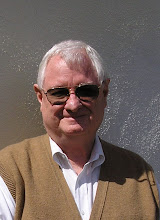 River La Fecht near Colmar, France - 1968
River La Fecht near Colmar, France - 1968 Jerry fills a wine bottle with Fecht River water.
Jerry fills a wine bottle with Fecht River water. In the summer of 1968, my wife Janne accompanied me on my first trip to Europe. We traveled with another young couple Stan, and his then wife Roberta Cerveny. We spent three incredible months following the advice of a popular travel book entitled Europe on $5 a Day. Our frugal friend Stan kept us to the budget... to the lira. Because we were traveling behind "the Iron Curtain", I kept only a sparce journal in the hope that it might be overlooked should we be disrupted by communist border guards. Here's a small excerpt from a small journal.
"As we crossed the border (from Switzerland) into the Alsace of France, everything was dead-quiet. We soon realized that the day was Assumption Day and a legal holiday in Catholic France. (The Assumption celebrates the Virgin Mary's lifting into heaven.)
The Alsace was superbly beautiful, rolling hills filled with grape vines and flat lands with tobacco and wheat. When we arrived in Colmar, there was a great wine festival in progress and it looked like we would have little chance to find a place to stay. But, we tried a motel anyway (to no avail)
Just about the time we were to leave, I wrote my name on a piece of paper and asked (the clerk) if he knew where the rive was? He said "of course" and pointed north, and said about "three kilometers ist der Fay-scht".
(note: This was the first time that I knew that our family had not botched the pronunciation of Fecht. It was not Fekt as the Germans say it, but a soft French way of saying our name as :Fay-t)
I became very exited. He couldn't understand what so special about the little river. I explained that it was my name, and he too became excited.
We drove off the main road, and down a little road, and there was a sign "La Fecht". It was a little thing, about the size of the Nodaway River in Iowa.
Bert (Roberta Cerveny - in 2009 our family dentist) caught her finger in the door just as we were about to go down to the water, but it was more of a cut than crushed was ok after a brief time. We posed for pictures and filled a wine bottle with water. We saw a bunny in a filed and looked for four-leaf clovers."
Long before that driving adventure in Europe, I discovered the name Fecht in my high school Latin book. I was reading Caesar's Gallic Chronicles at the time. Julius Caesar had ordered his men to build a camp near the source of the clear waters of the Fecht. Roman artifacts are still found in the fields of the Alsace to this day.
My father Bill Fecht was a splendid story teller. He loved to relate adventures of our ancestors who lived at the edge of a deep dark forest. He once told me that our "landsmen" had captured Caesar himself and taken him off into the deep woods. Many years later, I read an account in Plutarch's Lives, how Julius Caesar had indeed been captured by Helvetian Germans and taken into the forests at the based of the great Vosges Mountains. The Fecht River's source is high in the Vosges. Today a small cheese-making town called Munster graces the Fecht. I had a heck of an adventure looking for Fecht graves there, that I will save for another day. There is a recently discovered Solar Temple above Munster.
Caesar was disarmed by the Helvetii-Germans, a huge disgrace since Roman weapons were blessed and dedicated to their Gods. His soldiers finally rescued the famous despot, but his "gladdus" or short sword had been taken into the Vosges to a temple of the Sun God.
An old Alsatian story has it that Caesar's short sword is still kept by guardians in that part of Europe. The German word for a short sword is Fecht. Fecht schools in Germany or places where students learn to fence.

The Cervenys and Jerry approach the Fecht River in Alsace, France.
 Gerald Fecht stands beside the sign La Fecht.
Gerald Fecht stands beside the sign La Fecht.

No comments:
Post a Comment